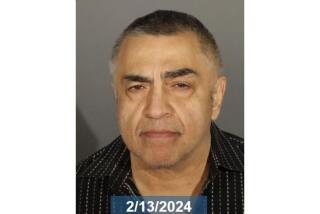FBI probing victim’s firm
Detectives investigating the stabbing death of a woman in a Century City high-rise parking garage earlier this week are looking for possible links to an ongoing FBI fraud inquiry of the international gold trading company that she and her estranged husband owned, law enforcement officials said.
The FBI examination of Goldfinger Coin & Bullion Sales and an associated Internet firm, e-Bullion, was underway before the killing, according to officials who spoke on the condition of anonymity because the murder investigation was ongoing. On Monday evening, a man with a knife killed 45-year-old Camarillo resident Pamela Fayed in the garage of the high-rise where she had been visiting a lawyer, investigators said.
The Los Angeles Police Department “is going to be working with the FBI” on the murder case, said Lt. Natalie Williams, who declined to discuss the investigation in any detail and added that it was too early to have developed a theory of the case. “Our detectives are out there pursuing a number of leads,” Williams said.
Officials have not named any suspects.
Among Goldfinger’s customers was a man later accused of funding terrorist organizations and defrauding investors, according to court documents.
Abdul Tawala ibn Ali Alishtari was indicted last year in New York and is awaiting trial on charges of funneling money through a Goldfinger account in Los Angeles several years ago as part of the fraud scheme, according to federal prosecutors and securities regulators. Alishtari has denied the allegations.
Goldfinger was not implicated in the alleged transactions.
In 2003, Alishtari, a Brooklyn, N.Y.-born entrepreneur, accused Goldfinger in a lawsuit of improperly freezing funds he deposited in an online bullion account, according to court records and attorneys. Goldfinger said in court papers that after its own investigation, it blocked transactions it considered suspicious.
The lawsuit was settled, lawyers for both parties said, after the firm agreed to release the funds.
It was not known what caused the FBI to focus on the Fayeds’ companies.
After James Fayed filed for divorce in October 2007, he and his wife started fighting bitterly over their jointly owned businesses, according to documents filed in the case.
Divorce records show that James Fayed sought a restraining order to keep Pamela away from Goldfinger’s Camarillo office and to restrict her access to company records. A court commissioner ruled that the couple did not have to produce or make public documents relating to “Alishtari (and subsequent FBI investigation).”
Pamela Fayed asked the court to “join” the businesses to the divorce, which would have removed them from James Fayed’s control as the divorce case proceeded. A hearing on the request was set for July 29, the day after Pamela Fayed was killed.
“Jim is distraught over the loss of his wife and is concerned about his safety and that of his . . . daughter,” said James Fayed’s attorney, Mark Werksman. He declined to elaborate on why the husband and daughter might be in danger.
Pamela Fayed was slashed and stabbed repeatedly about 6:30 p.m. Monday, police said. Witnesses heard her screams and described the killer as a slender man in his 20s who was wearing a black hooded sweat shirt and fled in a red SUV, according to investigators.
The Fayeds’ firms function as wholesalers of precious metals and provide trading services to individuals who wish to invest in gold and silver without dealing with the costs of storing, insuring and transporting bullion.
Goldfinger and e-Bullion say they maintain their own bullion vaults in Los Angeles, Delaware, Switzerland and Australia.
The companies say they allow account holders to access their funds through wire transfers and even a debit card that can be used at an ATM to “convert gold to cash,” as an e-Bullion executive put it in a 2002 press release. Such arrangements typically appeal to people harboring strong doubts about the stability of the international monetary system and who believe they are insulating their wealth from a global collapse by tying it to the value of gold.
In the divorce papers, Pamela Fayed said that the couple had bank accounts worth $12 million, plus stores of gold and silver kept in vaults.
Rick Copelan, president of Better Business Bureau for Santa Barbara, Ventura and San Luis Obispo counties, said the organization has given e-Bullion an F rating because of 16 unanswered complaints from customers over the last three years.
Copelan said he spoke to Pamela Fayed about the complaints, which included one from a customer who claimed to have lost $51,000 with the company. “They seem to have a pretty good pattern of problems,” Copelan said.
Meanwhile, court documents show that Pamela Fayed sought to obtain a restraining order in 2003 against Anthony Fayed, her brother-in-law, but her request was denied because of “insufficient facts.” She contended in court papers that he had harassed her and made “hateful racist remarks” after being fired from the family business.
In the court documents, James Fayed alleged that his wife “has a history of making false accusations.” He said that when he contemplated divorce in 2002, his wife threatened to retaliate by falsely claiming that he had assaulted her and had sexually assaulted one of their two daughters.
--
catherine saillant@latimes.com
richard.winton@latimes.com
andrew.blankstein@latimes.com
--
Times staff writers Scott Glover, Michael Hiltzik and Paul Pringle contributed to this report.
More to Read
Sign up for Essential California
The most important California stories and recommendations in your inbox every morning.
You may occasionally receive promotional content from the Los Angeles Times.












